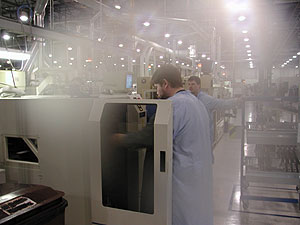| Iraq Conflict |
Audio
Photos
Your Voice
| |||||||||||||||||||||||
The economy of war
March 16, 2003
 |
| Pemstar in Rochester has worked for the military in the past, but company officials don't think a war in Iraq will bring new business. (MPR photo/Rob Schmitz) |
Rochester, Minn. — Like most manufacturers in Minnesota, Rochester technology company Pemstar is doing its best to stay afloat.
While its assembly lines remain in constant motion, the company has laid off more than 300 workers at facilities around the world. Its stock has nosedived and hasn't recovered. Even though Pemstar does regular work for the Defense Department, CEO Allen Berning says the nation's ramp-up to war won't necessarily improve the prospects for high-tech companies like Pemstar.
"Its certainly a mixed bag, from a technology standpoint," Berning says. "Since that's already down at very low levels, I don't think there will be a significant impact on how people are buying or using technology."
Despite being the home for a few defense contractors like the Edina-based Alliant Techsystems, Minnesota has gained little from the Bush administration's increase in military spending. When defense spending is taken as a per capita figure, Minnesota ranks just 43rd. According to state economist Jay Mousa, the threat of war could actually be hurting the state's economy.
|
I don't see manufacturing coming back. I definitely don't see it for Minnesota, and I don't see it for the United States.
- Bill Kuban, CEO of Kurt Manufacturing |
"During the past nine months, the one big dark cloud causing all the economic slowdown is the preparation for war with Iraq," Mousa says.
Mousa says businesses are hesitant to invest because of the prospects of war. He says a quick resolution to the Iraq situation would likely revive investors' confidence, improving the state's, and the nation's, economy. But, Mousa says, this would only happen under the best possible circumstances.
"If you are willing to take the risk, and assume that the war will be over in a few days, with few casualties and less terrorist attacks in the aftermath of the war and invest accordingly, you would probably be in good shape. But you are also taking a risk because things could go in the wrong direction," Mousa says.
And if things do go in the wrong direction, Mousa says Minnesota can expect more of the same -- lack of investor confidence and a manufacturing sector that continues to suffer.
Even the state's largest defense contractor, Alliant Techsystems, maintains it will not directly benefit from a war. The Edina-based ammunition and aerospace manufacturer recently reported a quarterly profit increase of 65 percent.
Defense industry analyst Peter Arment with JSA Research says it's unlikely a war would help boost Alliant's profits. He says the military began building its stockpiles after Sept. 11. And now it may well have what it needs for some time to come.
"They're seeing a general buildup in replenishment, in terms of inventory levels and contracts," Arment says. "But unless there were some long, sustained war activity, then you might see some individual orders that were tied to that specific event."
|
The kind of esoteric things that we do for the military have fewer and fewer of the kinds of applications that came out of World War II. We got jet aircraft, the computer, computer software, the semiconductor.
- Ann Markusen, U of M economist |
Alliant Tech did not respond to repeated requests for an interview. For some companies, defense contracts can be a sensitive topic. The head of the New Brighton-based Remmele cancelled a scheduled interview with MPR. Ten percent to 15 percent of its work is with the defense industry.
CEO Rich Pogue told MPR, "We don't want to be seen as being associated with war."
Some companies don't mind talking about their defense work, and the fact that they're not doing as much as in the past.
Fridley-based Kurt Manufacturing has seen its defense work decrease over the years. The company makes computerized tails for bombs. Kurt used to make 10,000 a year. Now it's down to just 300.
Kurt is experiencing other problems. In recent years, the company has cut its workforce from 1,100 to 525 full-time employees. Kurt CEO Bill Kuban says the state is experiencing the death of its manufacturing sector.
"I don't see manufacturing coming back," Kuban says. "I definitely don't see it for Minnesota, and I don't see it for the United States."
Kuban says the industry's prosperity of the 1990s will never be repeated. Many manufacturers have moved their work overseas, especially to China, to save money. Kuban says these companies won't be coming back to Minnesota anytime soon. He blames the state's high taxes and high energy bills caused by the climate.
Defense used to be an important source of business for Minnesota manufacturers. University of Minnesota economist Ann Markusen says in the 1950s and 1960s, the state made a lot of money from defense contracts. Much of the investment concentrated on developing new technology.
Markusen says companies like Honeywell and Control Data took technology developed for the military and applied it to the commercial sector. This helped stimulate the state's, and the nation's, economy. These days, Markusen says, it's harder to find those non-defense uses.
"The kind of esoteric things that we do for the military have fewer and fewer of the kinds of applications that came out of World War II," says Markusen. "We got jet aircraft, the computer, computer software, the semiconductor. We got these technologies that turned out to be incredibly positive in increasing other sectors in the economy."
In Rochester, Pemstar is trying to bring back that model. Medical instruments come spinning off the assembly line at Pemstar's Rochester plant. A couple of years ago, this is where Pemstar developed the U.S. Army's Land Warrior suit.
The Land Warrior intertwines high-tech firearms with computer, communications, and navigation gear. It is designed to give U.S. troops a communications and navigational edge over enemy forces. The company won't comment whether it will be used in Iraq, but the Defense Department just awarded Pemstar a $60 million contract to upgrade the suit.
It's a big project for Pemstar. CEO Allen Berning says it's especially important because of the suit's civilian potential.
"We see lots of good examples of where this technology could be applied into commercial," Berning says. "It ranges from some of the initiatives of homeland security to ... a high school kid warrior, where you could track your high school kid and know where they are, and you could tie this into any kind of group communication."
Berning says Pemstar is in the early stages of developing a similar suit for firefighters.
Economist Ann Markusen says if Minnesota companies can develop and maintain this kind of diversification, it could bode well in a post-war economy.
"I think Minnesota does have a very strong economy, a very resilient economy. Ironically, the place where Minnesota is most vulnerable is an economy which is really making a big swing towards military away from other things," Markusen says.
And until the pendulum swings back, she says, Minnesota manufacturers are likely to continue suffering.
|
News Headlines
|
Related Subjects
|

